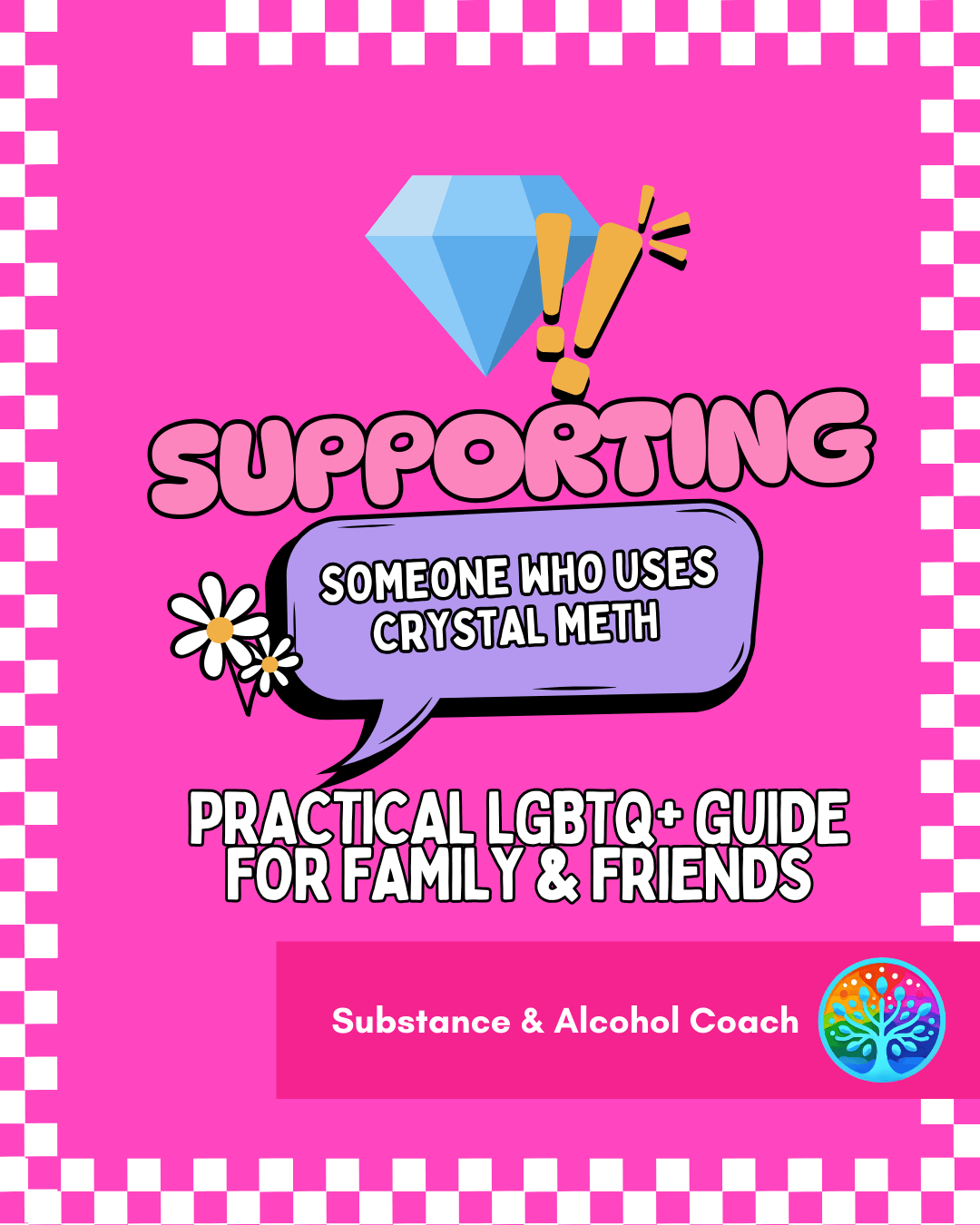
Supporting someone who uses Crystal Meth for family and friends
Supporting someone who uses crystal meth can feel overwhelming, especially if it’s a friend, partner or family member. There’s a lack of thorough information and you may worry about their safety, mental health or wellbeing.
One of the most requested materials among clinics I’ve worked in is a guide for supporting those using crystal meth family and friends. I’ve seen some terrible advice from so called “crystal meth coaches and influencers”. Advice that would simply just end your relationship with your family member or friend.
So here's a practical, realistic and compassionate guide for friends, family or partners of a LGBTQ+ crystal user.
📖 Understand crystal meth & the terminology
Crystal meth is a powerful stimulant and dissociative that can be smoked, snorted or injected. It affects mood, sleep and mental health, leading to anxiety, paranoia and in some cases psychosis. It may or may not be linked to sex (known as a chemsex). The pattern of crystal use often follows a similar path in gay, queer and bi men. Initially it’s used in social atmospheres; clubs, house parties or sex settings at the beginning and usually ends in using alone. Learning about the drug and its effects helps you approach the situation with empathy instead of judgment.
Crystal meth has its own names and terminology too. Users will usually use ‘known’ coded names or terminology to describe crystal and its paraphernalia. Crystal meth is known as many different names, crystal, meth, T, Tina or ice (due to its crystal appearance). Injecting apparatus such as needles are often described as pins. It’s important to understand its effects and the terminology around the sub culture of chemsex, party and play ‘PnP’, chill outs and afters.
Regular users usually have a cycle of using. Use, come down, early recovery, starting to feel healthy again and use again though sometimes this can be longer or shorter. Users may require stronger support around more difficult parts of their cycle. For example, if someone is using every 3 weeks you may want to focus your support around week 2 when they will be tempted to use again. Understanding someone’s triggers and helping them modify their behaviours will help them avoid lapse and relapse.
🦄 There’s underlying causes in gay, queer and other LGBTQ+
In most cases, there’s an underlying cause to crystal meth use as it rarely happens sponteanously. It can include shame, internalised homophobia (from present or adolescent years), loneliness, isolation, rejection, stress, gender and identity issues, mental health issues, low-self esteem, neurodiversity, trauma, abuse, sexual assault, body or sex and intimacy issues. Queer people are most vulnerable when they’re naked and crystal can help numb and disassociate those feelings.
Crystal meth lowers inhibitions and can provide temporary relief from feelings of shame, guilt or not being accepted, and any body or sexual performance issues. It can also falsify a sense of connection, belonging and intimacy.
In those who are ADD/ADHD crystal meth, being an amphetamine class drug, can provide temporary relief, confidence and focus similar to the medication prescribed for ADHD. Anecdotally, clients say they see a disconnect between how they react to meth compared to someone who’s neurotypical. Crystal meth tends to balance out some of their tendencies; this can make it very attractive proposition for regular use.
🗣️Engage in constructive dialogue, focus on listening.
Many people using crystal meth feel guilt, shame or fear about being judged. It’s important to maintain a balanced, calm, neutral, non-judgemental and compassionate approach. Harshness or criticism is likely to push your friend, partner or family member away or deeper into their crisis. You can only offer help and support to situations you know about so its important to not alienate, embarrass or shame the user.
Engage in constructive conversation with them. Ask them how it’s going? What they like and dislike about it? What effects or side effects is their use having? How does using fit with their lifestyle? Work? Gym? Do they feel supported enough? Do they know where to go when things get tough or if something goes wrong?
Questions that help the user lead to natural questions about their use are the goal here. Use open questions and avoid leading questions, statements, ultimatums or language with bias. Your goal is to build trust so they feel safe talking to you.
If they do ask for help, ensure you recommend talking to a professional. Local LGBTQ addiction services, mental health clinics or counsellors and coaches can help. If they’re not ready to stop then you may want to suggest some harm reduction strategies like using less or taking less with them, avoiding some people, places or environments, smoking rather than injecting or not mixing substances.
🙅🏼♂️ Have strong boundaries
Supporting someone using meth can be emotionally taxing. Depending on their type use, you may experience anything from mood swings, psychosis to violence and theft. It’s important to look after your own mental health while you are supporting your family, partner or friend.
It’s important to set personal boundaries on support; what will and wont you do. For example,
being available for regular phone calls, not giving money or covering up consequences of their use, or allowing drug use in your home.
💬 Offer ongoing support
Recovery takes a lot of time. Lapse and relapse are part of the process and can happen at anytime. It’s important however to learn from those lapses each time they happen. What happened? What went wrong? How can things be done differently next time to avoid it happening again? Keep showing care without judgment; even small steps, like regular check-ins, can make a big difference.
Find this page through a search engine? Return to the main site. Interested in talking more about the topic contained in this post? Contact me or DM via the social links in the footer.
